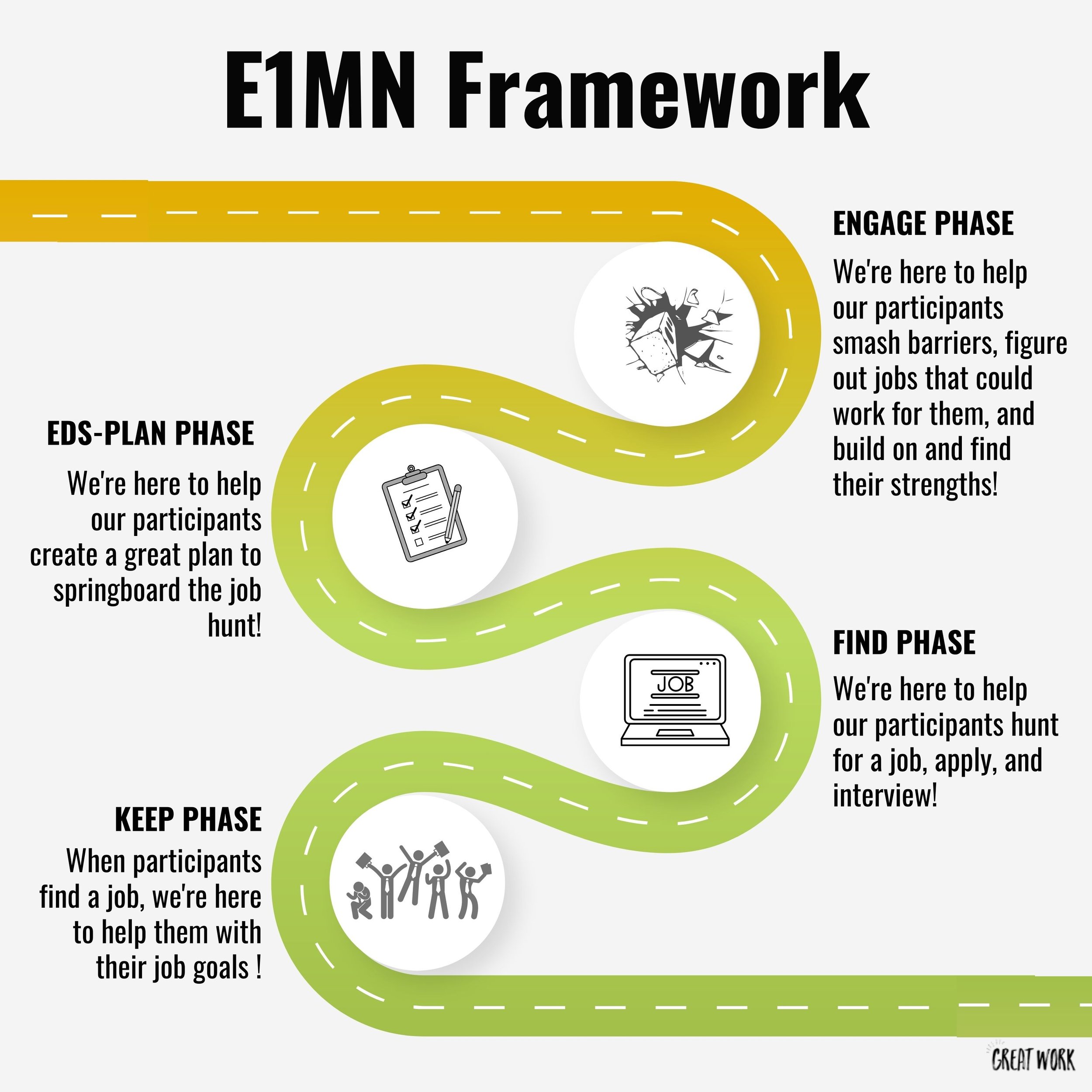Waiver Intake Meetings
Intake Meeting Overview
The purpose of an Intake meeting is to go over Great Work’s Intake Paperwork and to discuss how we can best support our participants.
The intake meeting is often the first time that we are meeting the client, their case manager and their guardians. During the meeting, we will be talking about what the individual would like our support with, what’s important to them, and review the necessary paperwork. .
Important Information: At the beginning of waiver services with Great Work, all waiver participants (EES, EDS, ESS) need to have an intake meeting!
If a participant goes from VRS services to Waiver services, they need another intake meeting.
A common example is if a client moves from the Find Phase (run by VRS) to the Keep Phase (Waiver service)
Participants don’t need a separate intake at the start of every service, only when they switch funders (from waiver to VRS / VRS to waiver).
If someone started at Great Work receiving EES services, they wouldn’t need an intake meeting to move to EDS Plan
What documents do we update?
Meeting Summary
This gives an outline of things to bring up during the meeting and is an opportunity to talk about how employment fits into all aspects of their life, such as home, cultural and social life.
Initial Plan
This describes the services we provide, health concerns, and risk of abuse. It is nearly identical to the Annual Plan we update during the 45-Day Meeting.
Release of Information
We are ONLY allowed to talk to people/organizations identified on the ROI!
Admission Record
This provides contact information and requests permission to take photos, get medical info, and give policies.
Phase Service Document
This document outlines the specific goals being worked on in each phase of the E1MN framework (i.e. Engage, Plan or Keep).
Important Information: Make sure you fill in all of the blank spots! If it doesn’t apply, type “NA”!
Intake Meeting Scheduling Email Template:
Intake Meetings include your participant and members of your participant’s team!
“Hello!
My name is [YOUR NAME] and I’m [INSERT PARTICIPANT’S NAME]’s [INSERT POSITION TITLE]! We recently received a referral for supporting [INSERT PARTICIPANT’S NAME] with [INSERT SERVICE NAME].
Our first step will be to set up an intake meeting where we'll go over Great Work's paperwork and discuss how we can best support [INSERT PARTICIPANT’S NAME]. This will be a Microsoft Teams meeting that will last about 45 minutes.
My availability for the next couple of weeks are:
[DAY], [DATE]: [TIMES]
[DAY], [DATE]: [TIMES]
…
Please let me know what times work for you and if you have any questions!
I’m excited to meet you all and start working with you!
Best,”
Intake Meeting Resources
Intake Meeting Guided Documents
Blank Intake Meeting documents with red guided text are located in 06_Guided_Documents. If your participant folder doesn’t have them, make a copy of them in your participant’s folder.
Example Intake Meeting Documents
Examples of various intake meeting documents are linked.
IAPP Examples
An IAPP stands for an Individual Abuse Prevention Plan . It assesses their risk of abuse . An IAPP is only needed for Waiver clients, not VRS .
Sexual Abuse:
Lack of understanding of sexuality.
Ellie may not recognize when someone is taking advantage of her sexually. Great Work will alert the team if they notice any behavior changes in Ellie. They will help Ellie understand what is happening to her is not okay and help her leave the situation.
Likely to seek or cooperate in an abusive situation.
Ellie may crave affection and may not understand that someone is taking advantage of her sexually. Great Work will help Ellie understand appropriate ways to show affection and alert the team, and or authorities if they suspect Ellies is being abused. Great Work will help Ellie remove herself from an abusive situation.
Inability to be assertive.
Ellie may not know how to say no or even if it’s okay to refuse someone’s inappropriate affection. Great Work will help Ellie realize she has the right to say no and leave an uncomfortable situation. Great Work will practice scenarios to help Ellie gain confidence in asserting her right to maintain her personal space if a situation arises.
Physical Abuse:
Inability to identify potentially dangerous situations.
Ellie may not recognize a violent situation that may be developing in her environment. She may not understand that an escalating argument could lead to her being physically hurt. Great Work will help Ellie identify when she or others are letting their negative emotions get out of control. If a situation arises, Great Work will help Ellie walk away from the situation to keep herself safe.
Lack of community orientation skills.
Ellie may not know where to go or who to ask for help when she is faced with physical abuse in the home or community. If Great Work becomes aware of an abusive situation involving Ellie, Great Work will notify the authorities and the team right away. Great Work will help Ellie leave the abusive situation and connect her to the resources she needs to be safe.
Inappropriate interactions with others. Verbally/physically abusive to others.
Ellie may not realize that being argumentative or yelling at others may cause someone to become violent against her. She may not recognize that the other person is reaching his or her limit of restraint. If the situation arises, Great Work will help Ellie remove herself from the area to allow herself and others to de-escalate.
“Victim” history exists.
Ellie has been a victim of physical abuse in the past. She does not have sufficient skills to know how to avoid abusive situations. Great Work will pay close attention to conversations with Ellie during check-ins and report any concerns to the team for further investigation.
Self-Abuse:
Dresses inappropriately.
Sometimes Ellie does not dress for the weather. Great Work will remind Ellie to put on a coat and hat when the temperature outside warrants it.
Refuses to eat.
Great Work will remind Ellie to eat healthy meals to preserve her strength and health.
Inability to care for self-help needs.
Ellie needs help from staff to complete basic hygiene and health needs. Great Work will remind Ellie of the importance of taking responsibility for keeping herself clean and eating a healthy diet.
Lack of self-preservation skills (ignores personal safety)
Ellie does not always pay attention to her surroundings when out in the community. Great Work will practice awareness with Ellie and help her become proficient in safely crossing streets and navigating uneven pavements, stairs, and escalators.
Engages in self-injurious behaviors.
Ellie lacks coping skills and will sometimes hit herself on the head when frustrated. Great Work will help Ellie identify what she is frustrated about and help her discover alternative ways to cope without hurting herself.
Neglects or refuses to take medications.
Ellie will sometimes forget or decide not to take her daily medication. Great Work will ask her during check-in if she took her medication. Great Work will remind Ellie of the importance of following the doctors’ prescriptions in order to avoid serious side effects.
Financial Exploitation
Inability to handle financial matters.
Ellie may not feel comfortable saying no to people who ask her for money. Great Work will help Ellie practice such phrases as, “I don’t have any money” or “I don’t carry cash” when asked for money from a friend, co-worker, or stranger.
The E1MN Framework
The Employment First Minnesota Framework (E1MN) is designed to help make sure that Great Work helps our participants explore employment, plan for employment, find a job, and keep a job that is a perfect fit for them! Click below to learn more about each phase:

